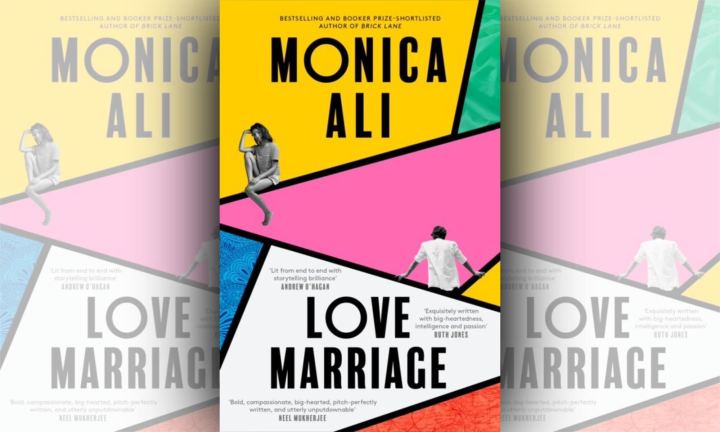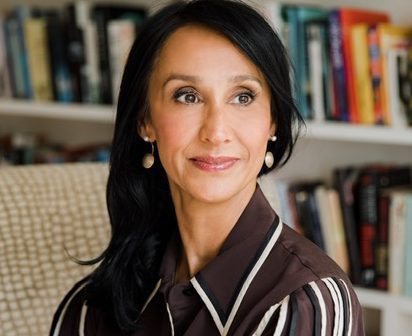BOOK REVIEW
Monica Ali’s Love Marriage is an astute commentary on issues of race, identity, belonging, and being ‘othered’

Ali draws upon these themes and carefully stitches them together in exquisite writing, with a plot that is unpredictable. She explores the complexity of the ways in which we approach sex. Harriet, in her feminism, is open about it - her sexual history; her body; her opinions.
In 2016, British author Monica Ali was working on two separate stories when she had a ‘lightbulb moment’ in merging the stories and bringing together their two main characters, Yasmin and Harriet. Ali instinctively knew that it would be fun to write a joint version of the two initial stories. She wrote the opening sentence, “In the Ghorami household sex was never mentioned” and was off and running with the rest of the book.
Love and Marriage chronicles the story of Yasmin Ghorami, a twenty-six-year-old doctor, about to marry Joe Sangster. The book opens with preparations underway for Yasmin’s parents, Anisah and Shaokat, originally from Bangladesh before settling in the United Kingdom, to meet Joe’s mother, Harriet, for dinner at her house.
Harriet is a feminist writer whose work has entailed posing naked with her “legs split wide, head raised to stare, challenging and defiant.” Yasmin is anxious about the coming together of her relatively conservative parents and Harriet, who has published a book on all her lovers. In preparation for meeting Harriet, Anisah buys a copy of her book. Yasmin’s brother, Arif, finds Anisah reading it with her foot on the bin pedal, her face aghast, before dumping it in the bin.
The opening scenes of the book are fraught with tension as well as humour as we journey with the Ghoramis to the dinner at Harriet’s. Despite the fact that Harriet is hosting, Anisah has spent the day cooking and the car is laden with a “Tupperware tower” filled with curries and other delicacies. Anisah has even gone so far as to plan the conversation – the weather and the upcoming wedding. In covering all her bases, she has read an article on gender and the pay gap. Meanwhile, the Tupperware, her mother’s florid dress with flowers and parakeets, and the fact that her father insists on leaving home two hours before the dinner, resulting in the family arriving at Harriet’s way before the time, horrify Yasmin.
Ali’s central theme in the book is sex: “In narrative terms, sex is the propeller that moves the story along. In terms of character, sex is at the heart of how the protagonists struggle with their identities or mature into them. In the relationships and family dynamics, sex is pivotal – in the creation of tension, drama, lies and shame. In a Freudian sense, it is every character’s weakness and strength.
“Sex is an important part of our identity; how we fall in line with other people’s expectations, how we hide our own desires even from ourselves, how we limit ourselves because of societal expectations which we’ve imbibed and internalised, or because of the way that male/female power dynamics function.”
In fact, sex is explored in intricate ways – its excesses, its limitations, its challenging of gender norms.

Author Monica Ali. Image: Yolande De Vries /Supplied
Ali draws upon these themes and carefully stitches them together in exquisite writing, with a plot that is unpredictable. She explores the complexity of the ways in which we approach sex. Harriet, in her feminism, is open about it – her sexual history; her body; her opinions. And she contrasts this with the cultural positioning of Yasmin’s family.
“For Yasmin, and her family,” she says, “sex is something that’s unmentionable, cloaked with secrets and lies. You could say that the engine of this book is infidelity, revenge sex, sexual addiction, covert incest, sexual violence, issues of sexual preference or identity. For Yasmin, it’s an integral part of her growth, of finding herself – both the good and bad bits of herself – and accepting them.”
Yet, Ali is careful in her juxtapositioning of Yasmin and her family against Harriet and Joe. “I think it’s important for me to emphasise something here. The assumption that South Asian cultures are more ‘closed’ and therefore somehow more ‘backward’ is interrogated in the unfolding of the novel. Yasmin at first admires how open Harriet and Joe supposedly are with each other. There’s no shame, there’s no hiding, there’s no need for cover stories. Sexuality is celebrated rather than hidden. Early on in the book, she’s thinking, ‘I’m going to tell Joe this terrible story about my mum embarrassing us at dinner, that in our family, we’re not open about things.’
“At some point she feels, when everyone’s finding out everything, that it’s not always easier to have everything out on the table. More fundamentally though, Harriet and Joe aren’t completely open, so there’s a facade there, as much as there are facades within the supposedly ‘closed’ cultures. I enjoy diving into complexity, and I think that’s what novels can do.”
Love Marriage is an astute, considered commentary on issues of race, identity, belonging, and being ‘othered.’ Race is interwoven with other intersectionalities such as that of class, gender, sexual orientation and religious affiliation. This is dealt with in a way that brings its complexity to the fore.
Yasmin, for example, is embarrassed by her mother’s flawed English but is equally uncomfortable with the fact that her father is “too correct”, making him sound like a foreigner. Ali’s skill in negotiating her way through these tricky subjects is adept.
As a character, Anisah shows up the fault lines by pushing her way out of the stereotype of what it means to be a Bangladeshi, middle-aged, married woman. Ali explains, “I am a big Jane Austin fan and she wrote endlessly about engagements, marriages and courtship rituals. She was also incredibly sharp about power, where it resides, and money. She has a lot to say about class; very finely observed gradations between the classes, even within the upper echelons. She captures all of that, and the role of women. Today we are in a very different landscape; it’s multi-cultural, women go out to work. Yasmin’s a doctor, but nevertheless, there is the same opportunity to explore cultural and social issues – through what marriage means, the expectations and customs surrounding it, how the families fit together, the differences in class, who’s going to pay for what…there is endless opportunity there, and it doesn’t have to be force-fitted.”
Love and Marriage will also make you laugh aloud, often. This was Ali’s intention. “As human beings, we are always seeking to transcend our limitations, reckon with our finite existence and the fact that life can be both painful and destructive. Comedy and laughter are essential, not only to counter darkness and despair, but also to keep ourselves intellectually honest. Without it, our capacity for self-delusion is pretty much limitless. All the folly of our human striving can – and in my view should be embraced with humour, celebrated in its multiplicity, its excessiveness.”
Love Marriage makes for a gripping read that is hard to put down. It is an intellectual engagement in thinking about families, culture, and dealing with diversity. These issues are explored through riveting story arc with carefully crafted characters. Ali says, “I think that families, no matter their ethnicity or geographical location, face so many knotty relationships that are recognisable across seemingly large divides. Writing comes from character, and character is endlessly complicated. It’s in relation to other people that our character reveals itself, and there’s often a gap between our perceived ‘personality’ and our deep character.
“I don’t believe in the notion of a ‘solid’ self somewhere. I think that kind of self just doesn’t exist. It’s a dynamic process spatially and over time. Depending on where you are, where you happen to have been born, and in relationship to others. So that’s the way I approach the writing of my characters.” DM/ ML
Joy Watson is a feminist researcher and writer. She has worked on research initiatives in South Africa as well as internationally, including for the UN Habitat’s Safer Cities programme, and has served as a technical advisor to UN Women initiatives. Together with Amanda Gouws, she has co-edited the book, Nasty Women Talk Back, A Collection of Feminist Essays on the Global Women’s Marches (Imbali, 2018). Her debut novel, The Other Me was published by Karavan Press in February 2022.

















 Become an Insider
Become an Insider
Comments - Please login in order to comment.